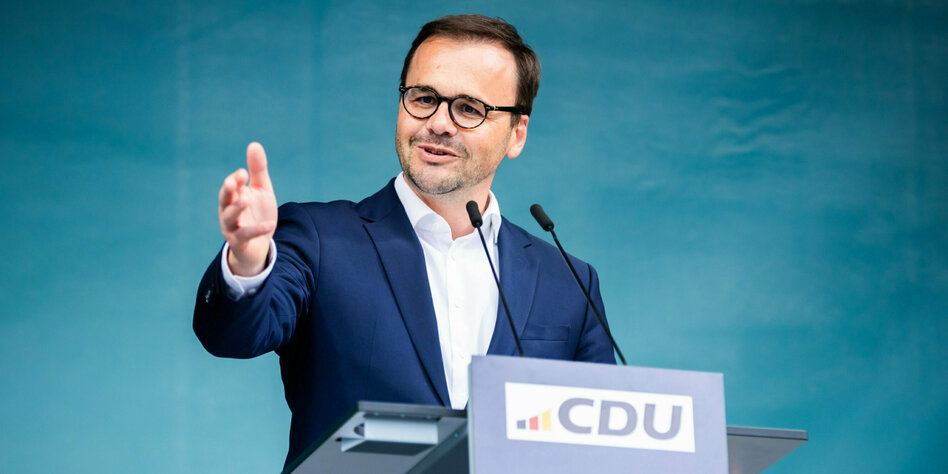The CDU Presidium is meeting to discuss the regional elections in Saxony, Thuringia and Brandenburg. It has no new strategy to offer.

Jan Redmann, state chairman of the CDU in Brandenburg, wants to go “from church tower to church tower” with a wooden bench during the election campaign Photo: Christoph Soeder/dpa
SEDAN cup | On Sunday, when France's far-right National Assembly (RN) emerged as the strongest force in the first round of parliamentary elections, the CDU's executive committee met in a Berlin hotel for a two-day retreat. On Monday, General Secretary Carsten Linnemann presented the results. The development of the conservative party in France worries him, Linnemann said in response to a question from a journalist. He is happy with the development of the CDU, which is aiming upwards in a completely different way than in France.
What Linnemann did not mention is that the remnants of the French Republicans are currently falling apart over the question of cooperation with the RN. The CDU is far from the situation of the French Republicans. But the results of the state elections in September in Saxony, Thuringia and Brandenburg and the subsequent formation of governments could also be a test for them.
At the closed-door meeting, the CDU leadership was invited by an election researcher from Infratest Dimap and sociologist Steffen Mau from the Humboldt University of Berlin, who is currently one of the most prominent explainers of East Germany. There were discussions about East Germany in a depth that had never been discussed before in the Presidium, said Brandenburg state leader Jan Redmann, who attended the press conference with Linnemann. He would like to take up the post of Prime Minister in the Potsdam State Chancellery in the autumn.
Redmann regretted the loss of confidence in politics as a whole, which he attributes to the policies of the federal government, in which the CDU is known to have no involvement. The reduction in ICE stops and the closure of hospitals in East Germany also led in exactly the wrong direction. The CDU, on the other hand, corrected old positions with the new basic programme, which is a step towards regaining lost confidence.
In the wake of rising child and youth crime, she called for a reduction in criminal liability for children aged 14 to 12 and for teenagers to no longer be tried under juvenile criminal law but under adult criminal law. Linnemann had previously harshly criticised “uncontrolled and uncontrolled migration”. Internal security and migration are the topics the CDU wants to address. If the discussion in the CDU presidium had yielded further results in view of the three regional elections, Linnemann and Redmann kept that to themselves.
From church tower to church tower
But the federal leader also brought with him a concrete idea: during the election campaign in Brandenburg he wants to go “from church tower to church tower” with a wooden bench in order to be able to talk directly to the people. In this way he hopes to build new trust among the people of Brandenburg. And his state CDU also wants to try to win over the voters of the SPD, the Greens and the FDP with a first-ballot campaign. His candidates would have no chance anyway; the logic behind this is therefore a question of whether the CDU or AfD will win the direct mandates.
The CDU, on the other hand, prefers not to talk about possible government alliances in September. The CDU ruled out coalitions with the Left and the AfD, which emerged as the strongest force in the European elections in all three countries, in a resolution at the party conference. The Sahra Wagenknecht Alliance (BSW), which is expected to do well according to polls, could therefore play a key role. Recently, party leader Friedrich Merz caused a stir when he ruled out collaboration with the BSW in an interview, and the regional associations in East Germany were quick to intervene.
Since then, the language has been in place: there will be no cooperation at the federal level, but the states have “freedom” in this matter. But it is also clear to everyone: cooperation with the BSW could lead to huge internal party disputes, both in the affected state associations and at the federal level. According to those involved, Redmann proposed a survey among his members before a possible coalition was formed. But what do you do when the members destroy the only possible government formation?
The CDU presidium also discussed the results of the European elections, which the Union won but where it came in at the lower end of the spectrum than expected, given the anti-traffic light sentiment. This was expressed by Merz himself after the election. The agenda also included the federal elections, which Linnemann says could take place this year with a probability of one third (“The word vote of confidence is heard more and more in the corridors”), and various scenarios are being considered.
And question K?
A federal election campaign could be prepared within ten weeks, Linnemann said. With the new basic programme that the party recently adopted, there is a good basis for a government programme. He and Parliamentary Director Torsten Frei would coordinate its creation. The Presidium and the party associations should play an important role in this. However, Linnemann only mentioned the association of medium-sized companies and its chairwoman, Gitta Connemann, by name. When it comes to business, she is his first point of contact.
According to the participants, one thing was not discussed: the question of the candidate for chancellor. But of course this resonates with everything that the CDU is currently discussing. Especially since both CSU boss Markus Söder and North Rhine-Westphalia Prime Minister Hendrik Wüst will clearly remain in the game. But the CDU does not want to make an official decision on this until after the three regional elections.
